20 Years After ‘The Room’: The Actor Who Survived the Best Worst Movie Ever Made
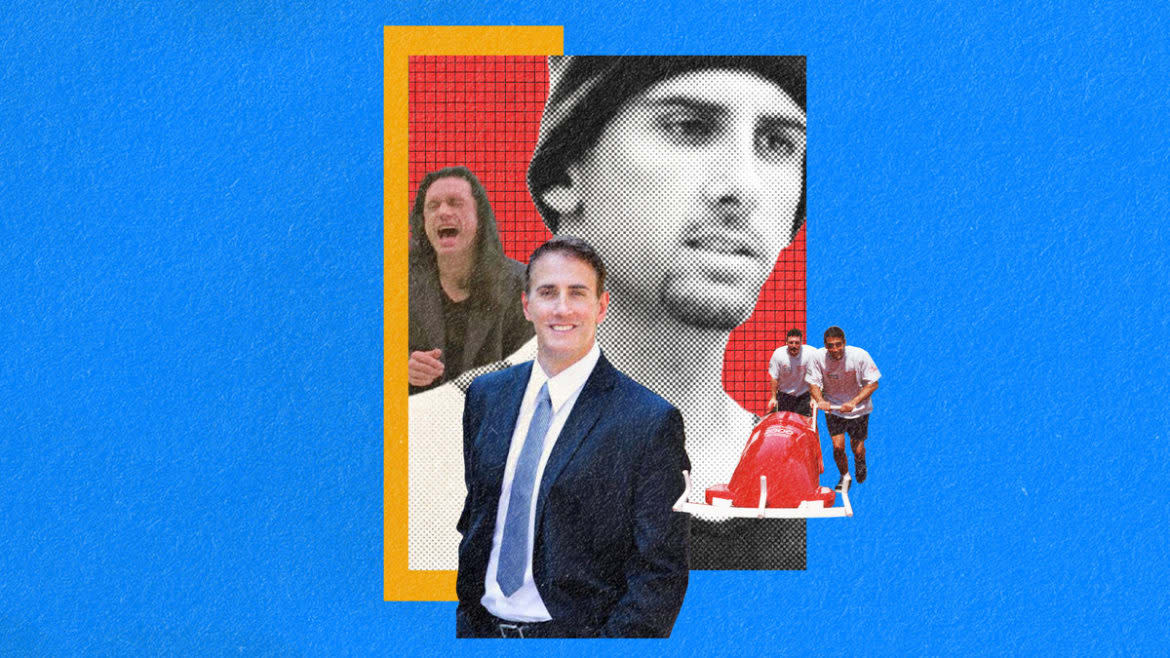
- Oops!Something went wrong.Please try again later.
- Oops!Something went wrong.Please try again later.
- Oops!Something went wrong.Please try again later.
- Oops!Something went wrong.Please try again later.
Dan Janjigian had made it all the way to the Olympic Games to compete under a flag that was upside down.
He squinted up at the three stripes of the Armenian flag—apricot on top, followed by bands of blue and red—flying high over the “Salt Lake 2002” banner. Then he went to quietly alert a staffer that the apricot, in actual fact, was supposed to be on the bottom.
The flag was flipped within minutes. Potential diplomatic incident successfully averted, Janjigian went to go find his brakeman. The pair of them would soon be hurtling down an icy chute at literal breakneck speeds in a contraption best described as the Hyundai to other teams’ Ferraris, and they needed to get ready.
Janjigian was bobsledding for Armenia. When the event came to a close several days later, he’d placed 33rd. But he and his teammate—a Greek-American buddy he’d recruited—were delighted as they headed home to California, having achieved a new personal best racing time.
A month later, Janjigian packed up his life in San Jose and moved to Los Angeles, now determined to pursue a career as an actor. “Almost immediately,” according to him, he landed a role in a new feature film. It was called The Room.
No one who cringed their way through The Room’s awkward premiere in the summer of 2003 expected it to make much of a dent in the cultural consciousness, let alone stick around long enough to be crowned the Worst Movie Ever Made. But 20 years later, that’s where we are, and The Room has the cult status symbols—notably, the rabid fanbase and the tsunami of memes—to prove it.
The film hardly needs an introduction, but Dan Janjigian is another story.
He played Chris-R (yes, there’s a hyphen, and no, you can’t just call him “Chris”), a nefarious drug dealer who barges onto a rooftop and threatens another character with a gun. After demanding to know where his “fucking money” is, Chris-R is promptly tackled by two other characters, who perform a citizen’s arrest and escort him offscreen. (“Don’t worry, he’s going to jail!” another character wails.)
All of this happens in less time than it takes to pop a bag of popcorn. But in just over 80 seconds, Janjigian managed to turn in “what is commonly regarded as the single best performance in The Room,” according to castmate Greg Sestero, who wrote the definitive behind-the-scenes book, The Disaster Artist, capturing the madness.
The fans seem to agree. “While the other actors come across as children in a school play, he acts like he’s on The Wire,” one awed Redditor remarked a few years ago.
What It Was Like Watching James Franco’s ‘The Disaster Artist’ with ‘The Room’s’ Tommy Wiseau
Janjigian, now 51, exudes the easygoing charm of a neighborhood dad whose biggest concern is teaching his 10-year-old daughter not to cheat at card games. (It’s a work in progress.) Even over Zoom, speaking to The Daily Beast’s Obsessed on the occasion of The Room’s 20th anniversary, his vibe is tangibly that of the nicest jock you knew in high school, mixed with a dash of Tony Robbins’ corporate optimism and a propensity for being in the right place at the right time.
All of that belies a certain burning intensity that The Room captured in glorious 35mm (and also, infamously, simultaneously on digital video). It still stabs through occasionally, like when Janjigian casually drops that he’s currently fasting as a “willpower feat,” or when he reflects on his 2020 bid for Congress (we’ll get there).
It also comes through when he’s trying to explain why a series of seemingly unconnected events—an Olympic bid, a part in shaping cinema infamy, a political campaign—have disrupted an otherwise steady life line, spiking occasionally into what looks like stochastic madness.
“My attitude has always been,” he said, mulling the words, “whatever opportunity I have put in front of me, if I have the chance to do it, and the means to do it, I’m gonna do it.”
And, to hear him tell it, it all goes back to a woman who escaped a genocide more than a century ago.
The Bobsledder
Janjigian’s grandmother, Nevart Karagozian, came to America when she was 12. Escaping the Armenian genocide of 1915, she had posed as a Turkish refugee and “found a way to go through orphanages” to get there, according to a story in The Armenian Mirror-Spectator.
She settled down in California around 1920. Decades later, in the late 1970s, she moved in with Janjigian and his family. Then 4 or 5 years old, he was entranced by the woman who walked with a stoop and laughed uproariously at her own farts. She was the coolest person he’d ever met.
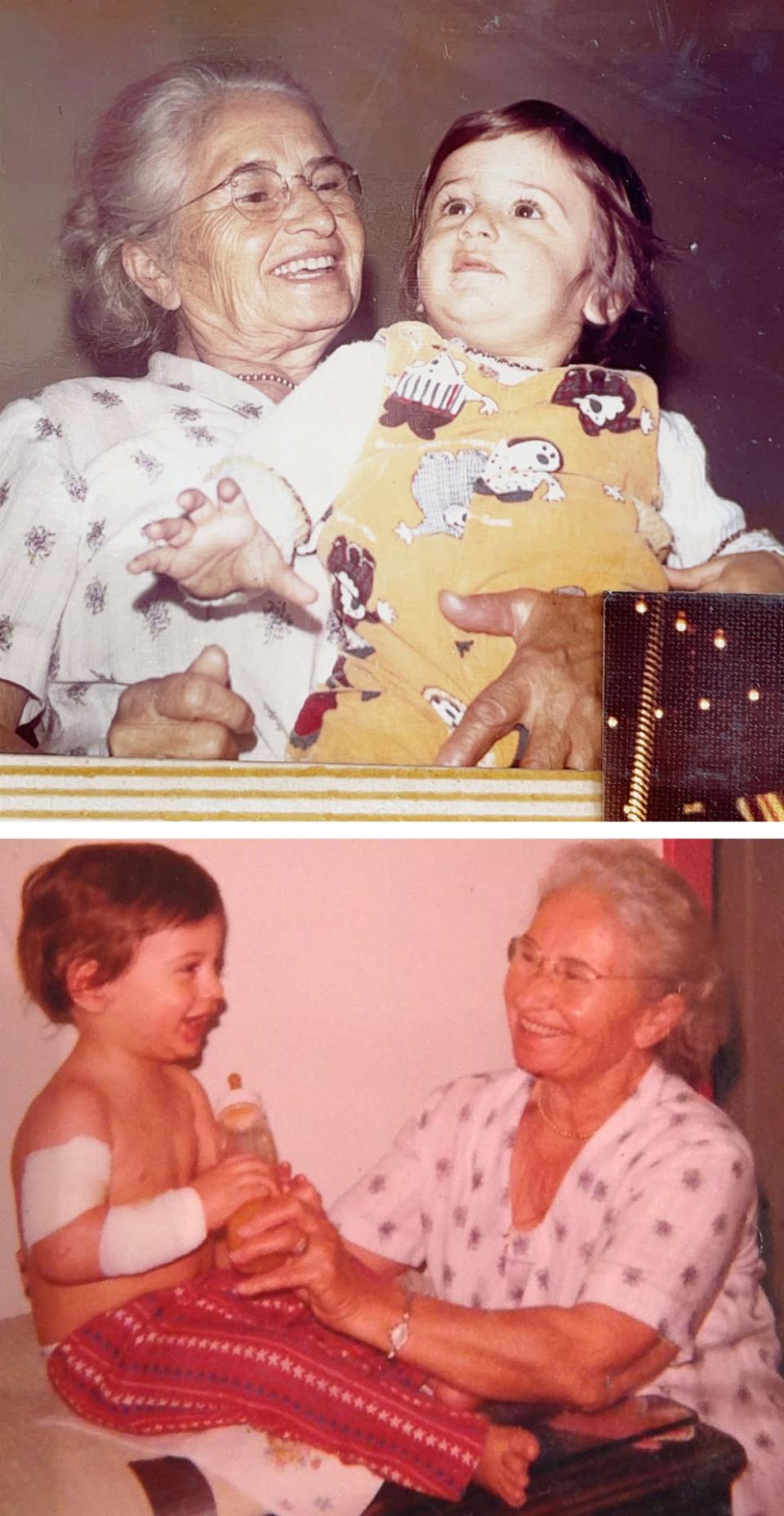
That his grandmother had survived—and, by extension, that he had been born at all—seemed to Janjigian to be the result of some cosmic lottery that she had won somewhere along the line. Given that chance was all that separated him from the yawning void of nonexistence, he figured he’d better make the most of life.
In high school, he lettered in baseball, waterpolo, and wrestling. He ran for student government and, fueled by pride in his grandmother and local community, papered the hallways with his campaign slogan: “Vote for Dan: He’s Armenian.” (He lost.)
His dad wanted him to be an engineer, so, in 1991, Janjigian went to California Polytechnic State University to learn how. But the kid who’d grown up smooth-talking his neighbors into buying newspaper subscriptions and stationery was being tugged in another direction. He switched his major to business administration and started working in Silicon Valley soon after graduation.
His life seemed to be shaping up nicely—pleasantly conventional, at least—when he went to a cousin’s wedding in Chicago. There, Janjigian met a guy called John-Andrew Kambanis, a financial analyst who was getting ready to compete for Greece in the 1998 Winter Olympic Games’ two-man bobsledding event.
The pair got to talking, Kambanis craning his neck up at Janjigian, who stood more than six inches taller than him. When Janjigian mentioned that he liked to race motorcycles for fun, Kambanis perked up. He asked if Janjigian had ever considered learning how to bobsled. “You’d love it,” he told him.
Janjigian didn’t have to think too hard about it. He jumped on a plane and flew up to Canada, where in Calgary he found a bobsled track and a handful of world-class coaches willing to train any novice able to pony up. Every day for a week, he’d strap on crampons and walk the 1,475-meter ice track, breaking it down in his head, committing every bump and curve to memory. “I still have dreams about those frickin’ turns,” Janjigian told Obsessed.
The adrenaline fix was unbeatable. After leaving Calgary, Janjigian started entering competitions. By the time the 2002 Olympics crested the horizon, he was intent on being a part of it. That he’d pilot a sled for Armenia was a no-brainer. Finding a brakeman proved to be more of a challenge.
After two false starts involving teammates who were felled by a back injury and 9/11-related visa issues, respectively, he recruited Yorgo Alexandrou. Alexandrou was a friend from San Jose with Greek roots and no bobsledding experience. Close enough. The Armenian government scrambled to arrange temporary residence for Alexandrou, and the newly formed team began competing in the hopes of qualifying for the Games.
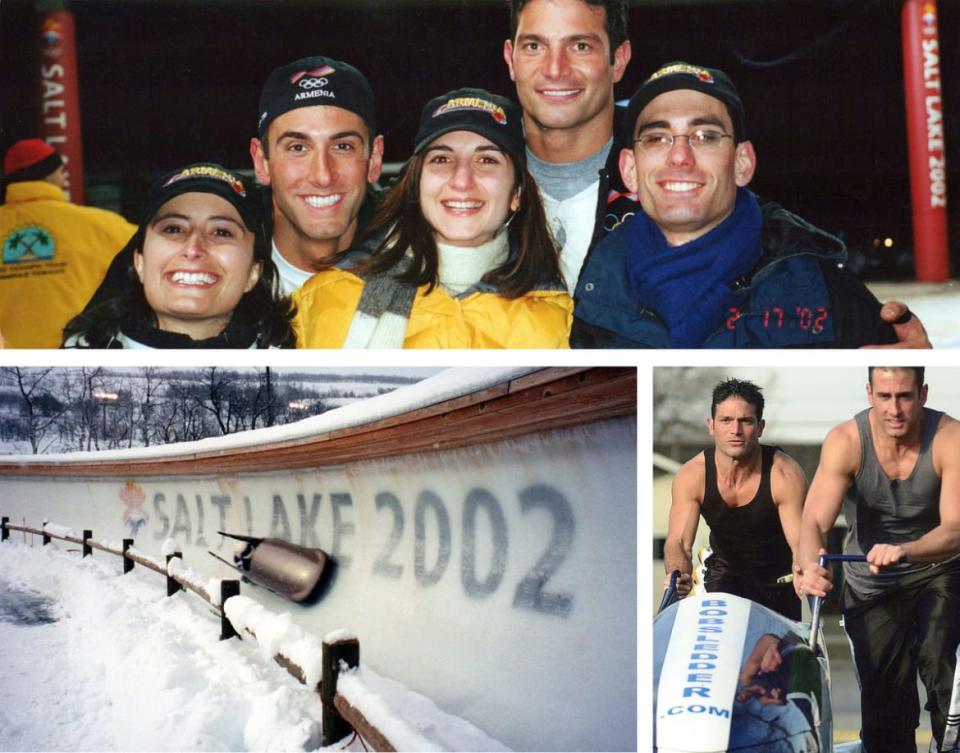
They came dead last in their first competition. Hoping to improve their long-shot odds, Janjigian decided they would train their guts out, and they’d do it in San Jose. The one-time engineering student modified his sled for road conditions, putting in-line skate wheels on a frame to replace its runners.
Day after day, Janjigian and Alexandrou would sweep the leaves off the street, set up their timing lights, and practice their push start. Passersby would stop and residents would come out of their homes to gawk at the 9-foot, 400-pound bobsled whizzing down Welch Avenue.
In December 2001, on the last run of their last race at the last qualifying event, they made it.
Spot at the Games assured, the Armenian team went back to San Jose. This time, their training sessions were observed not only by curious locals, but also reporters looking for an underdog story. The affably fratty pair, sporting muscle tees and huge grins, were interviewed by the Associated Press, ESPN, ABC, NBC, and CBS, all of which delighted in the “unlikely Olympians waging an uphill battle in a downhill sport,” as CNN called them.
In February, they went to Salt Lake City and got thrashed. That year’s Jamaican bobsledding team finished several rungs higher than Janjigian and Alexandrou. But “our best four runs ever were on that track,” Janjigian said. “We kept getting better and better, all the way through. I couldn’t have been more pleased.”
But his proudest moment had come a few days earlier. After the opening ceremony, his mother had called to tell him that, when Armenia’s athletes had appeared on the family’s television, his 92-year-old grandmother had stood up to her full height of four foot seven inches, rising in salute.
The Actor
That same year, Janjigian landed on the set of The Room like “a Hellfire missile,” Sestero later wrote in 2013’s The Disaster Artist.
He’d booked the gig after his roommate, a buddy from college who’d been cast in the movie, came home and suggested he audition. They’re looking for a thug, the roommate said. Dude, you’d be perfect.
So Janjigian walked into his first audition ever and met Tommy Wiseau, a man who looks, sounds, and thinks like no human being ever has. Janjigian was unruffled—Hollywood types were supposed to be a little eccentric, right?—and Wiseau seemed to think he was the right man to play Chris-R.
That Wiseau was no ordinary Hollywood type, and The Room no ordinary movie, wouldn’t dawn on Janjigian until much later.
Inside Tommy Wiseau’s Wild, Years-Long Battle to Block a Tell-All Documentary on ‘The Room’
For the uninitiated, The Room is “the movie that an alien who has never seen a movie might make after having movies thoroughly explained to him,” according to a 2010 article in Harper’s. An absurd tale of betrayal played deadly straight, it concerns a love triangle between Johnny, a man who would do anything for his girl; Mark, his best friend who’s very busy all the time; and Lisa, a woman written as a scheming succubus in a red dress.
It is crammed to bursting with deliciously awkward dialogue, continuity errors, characters who enter and vanish without explanation, and nonsensical and painfully drawn-out sex scenes. It is rife with scuzzy slow-jams, people tossing around the ol’ pigskin, and framed pictures of spoons. It is equal parts nightmarish community theater and inadvertent Dadaist masterpiece.
It is also burdened with what one early observer called “peculiar plot cul-de-sacs” that go nowhere. The undisputed king of those cul-de-sacs is Chris-R, who, again, bursts onscreen, waves a gun around and demands his money, and is hustled offscreen—never to be mentioned again—in the span of about 83 seconds.
So why is Chris-R in The Room? Though he’s never confirmed it, Wiseau seems to harbor a special fondness for the character. During production, he remarked that Chris-R was “such good character… like Al Capone,” according to Sestero’s book. A few years ago, he took to Reddit to promise the eventual return of Chris-R. (Janjigian hasn’t heard anything about a sequel or spinoff.)
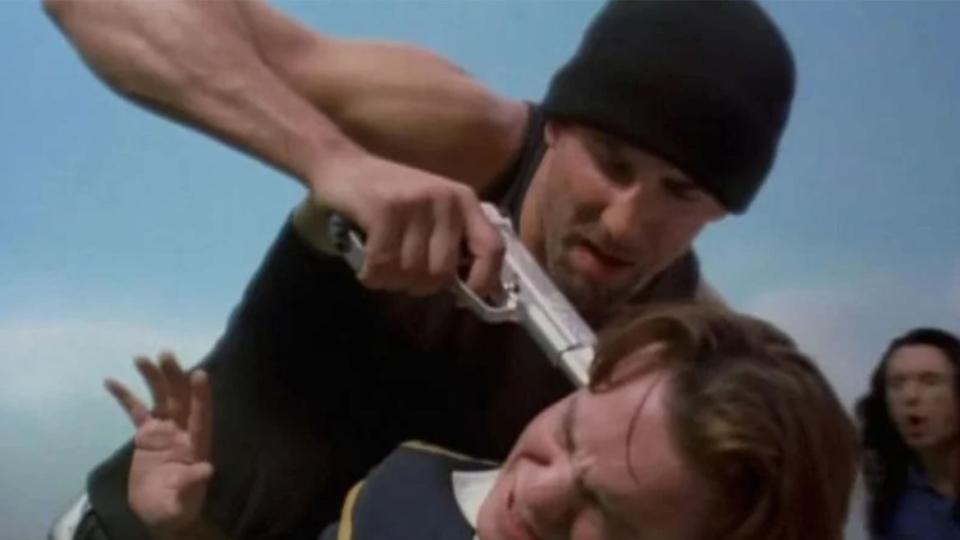
On day one, Janjigian rolled up to set already—and alarmingly—in character, according to Sestero. “He was at times so frighteningly locked into Chris-R that no one dared talk to him,” he wrote. “Between rehearsals, Dan would stalk back and forth along the set’s edge, muttering and swearing, keeping himself angry.”
That he had gone full Method on the sidelines is something Janjigian acknowledges today with a mild shrug. “I have a really long fuse,” he said. “That’s a good thing in life. It’s a bad thing if you’re playing a tough [guy] in a movie. So, yeah, I needed to pump myself up.”
It was hard to sustain that level of pissed-off energy for the two weeks it took to film the short alley scene. “We literally filmed it like 40 times,” Janjigian said. “[Wiseau] loved it. Like, he filmed it again and again and again. Every day. With very little difference.”
Inevitably, Wiseau burned his way to the end of Janjigian’s fuse. Playing the movie’s hero, Wiseau had to tackle Janjigian in the scene, wrenching him off another actor. “He was, like, petting me. He wasn’t grabbing me,” Janjigian recalled. “I was livid. So I just grabbed him by the collar and put him up against the wall. Like: ‘If you’re not gonna fucking pull me, then stay out of the scene!’ Next [take], he pulled me.”
Sestero witnessed the outburst. In his telling, relayed in The Disaster Artist, Janjigian snarls at Wiseau, “If you’re going to grab my arm, really fucking grab it! You’re jumping on me like a pussy!” and stalks off.
His director watches him go, cowed. “My God,” Wiseau says, awe in his voice. “He’s like monster.”
The next year, The Room dropped like a stone into its first theater. The premiere was deeply uncomfortable; several members of the cast had the sick feeling they’d been duped into participating in soft-core porn. Janjigian slunk out after the screening, vowing to keep The Room off his resume.
A few weeks later, he got a call from the actor who’d played Mike (a character fans would later dub “random blowjob guy”). “He goes, ‘Hey, you gotta come with me to the showing tonight,’” Janjigian recalled. “‘You won’t believe it.’”
The Room was still showing? Confused, Janjigian agreed to come check it out. Hiding in the back of the theater, he watched as the movie began to play and its packed-out audience promptly went feral. Many of the hallmarks of a modern-day screening—the sex-scene singalongs, the cancer jokes, the spoon-chucking—were already cemented.
Propelled by a handful of weirdos who knew a legend in the making when they saw it, word of the movie had ripped around the local community of midnight movie mavens, schlock connoisseurs, and out-of-work actors. “We saw it four times in three days, and on the last day I had over 100 people there,” Michael Rousselet, an early fan who would go on to form the comedy troupe 5-Second Films, told Entertainment Weekly in 2008.
“It was crazy,” Janjigian said. “There were all these people that were dressed up as our characters. I saw a dozen Chris-Rs. A lot more Tommies. Tons of guys dressed up as Lisa.”
In the ensuing two decades, The Room’s fandom bloomed like a contagion, bolstered by regular midnight screenings, often attended by Wiseau or other members of the cast. It became a point-and-click computer game, a stage play, and the subject of endless academic analysis. A fan named James Franco reviewed Sestero’s memoir for Vice, then turned the book into a Golden Globe-winning movie, which he directed and starred in.
My Surreal ‘Disaster Artist’ Date With Kris Jenner
While the gospel of The Room spread, growing from underground to mainstream obsession, Janjigian was getting on with his life. He moved to Austin, settled down, and started a family. He worked in insurance before moving on to mergers and acquisitions, doing a little motivational speaking and professional coaching on the side. He went on Wheel of Fortune in 2013; he came in third.
He also stopped bobsledding in 2007, after dislocating his shoulder and suffering a nasty crash in a race. A year later, his grandmother died. She was 100 years old. She never watched The Room, according to Janjigian, who wrote in a later email to Obsessed, “That was probably for the best!”
The Politician
Even as he hit all the expected benchmarks, Janjigian’s life kept being punctuated by reminders that he’d been in one of the best-worst movies ever made. It was announced in 2015 that Zac Efron had been cast as him in the film adaptation of The Disaster Artist—and Janjigian’s eldest daughter was forced to concede that her dad was kind of cool. He took her to the Los Angeles premiere two years later, where they met Franco and a host of other A-listers.
Wiseau was also there, and (pointedly, to Janjigian’s mind) ignored him. Aside from Sestero, with whom he remains close, Wiseau has carefully kept his distance from the rest of his former castmates, several of whom told The Huffington Post in 2016 that he is anxious they might “alter his narrative.”
It was easy to feel boxed out of the action. With Wiseau sucking up all the oxygen in (ahem) the room, the others either found creative workarounds—a memoir in comic book form, a YouTube mockumentary series—or moved on with their lives. Janjigian sort of did both.
Specifically, he ran for congressional office in 2020, and put his Hollywood credentials on the cover of the flyers he mailed out to Texans. “Dan Janjigian: Not Your Typical Politician,” a box next to a picture of a Chris-R bobblehead read. “Dan starred in the cult-classic film The Room.”
He’d successfully sold himself as an athlete and an actor. Why not politics? In his years doing sales, he estimated, he’d sat with more families around their kitchen tables than any politician. “I’d sit down with you and your husband or your wife, and I’d show you a product,” he said. “And while you’re doing that, you’re building rapport. You’re learning about them. They talk about what’s important to them.”
Eventually, he said, he just got tired “of being an armchair quarterback.”
Registering to run as a Democrat, he styled himself as a commonsense politician who could bring both sides of the aisle together on issues of health care, immigration, and the environment. His campaign materials heavily referenced his relationship to his grandmother—“I get my strength from her”—and his days at the Olympics.
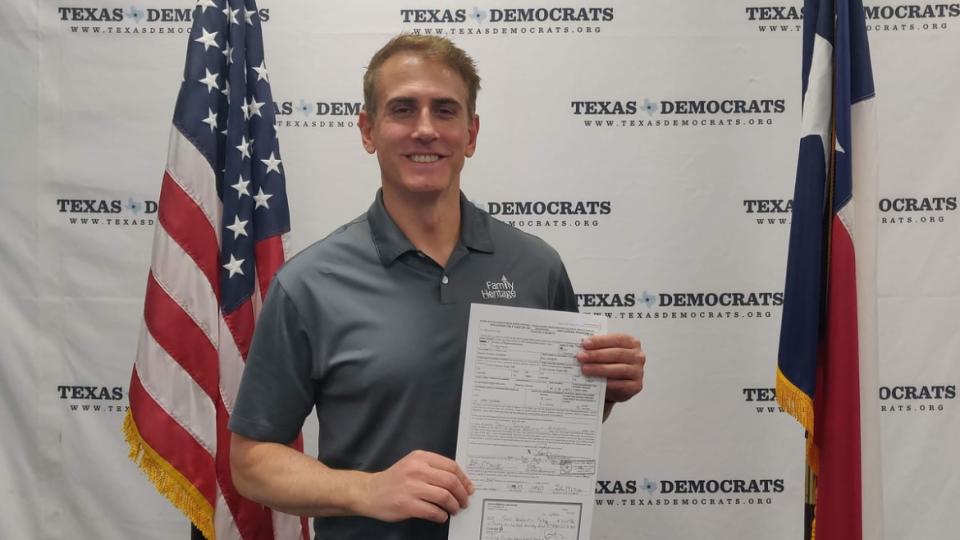
He got destroyed. One candidate, a local lawyer who’d entered the race late, dropped out a few days before the primary election and still got more votes than him. Coming last stung.
“I’m a pretty big optimist,” Janjigian said. On the day of the primary, he’d stood outside a polling station and gotten what had seemed like a promising response from the voters emerging. “I thought, we’re definitely gonna take this. I just felt like we had a good shot. And then to have the numbers come out… [It] was really shocking.”
He retreated as the election moved on without him (with the winning candidate going on to lose to the Republican incumbent). He scrutinized his game. He shouldn’t have mailed out so many flyers; he should’ve spent more time knocking on doors and meeting people. He was a salesman at heart, after all, so why hadn’t that been the gameplan in the first place?
But Janjigian will insist to you he loves failing with a certain gleam of Chris-R-like fervor. It’s a learning opportunity, and it’s what will take him on to his next thing, whatever that may be. The sky’s the limit, and even if he crashes back down to earth on one rocket, it’s just another chance to find another, even cooler ride.
Fail long and loudly enough, and it also becomes the glue that seals your legacy. That’s not a bad thing, according to Janjigian. “I don’t devalue any of it,” he said. He was musing about The Room, but he could have been speaking about anything—everything—that had happened to him so far. “I just feel very fortunate to have something I can look back fondly on.”
Keep obsessing! Sign up for the Daily Beast’s Obsessed newsletter and follow us on Facebook, Twitter, Instagram and TikTok.
Get the Daily Beast's biggest scoops and scandals delivered right to your inbox. Sign up now.
Stay informed and gain unlimited access to the Daily Beast's unmatched reporting. Subscribe now.

